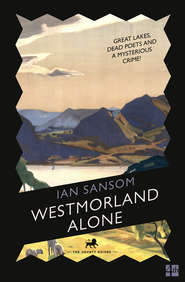По всем вопросам обращайтесь на: info@litportal.ru
(©) 2003-2024.
✖
Death in Devon
Автор
Год написания книги
2019
Настройки чтения
Размер шрифта
Высота строк
Поля
‘Thank you,’ said Morley. ‘No need.’
For navigational purposes Morley had cut up and mounted onto thin oak boards a large Philip’s Road Atlas of Britain, dividing England county by county into squares of approximately nine by six inches. It was my job to arrange these giant county playing cards, as it were, into some kind of meaningful hand, and then to deal out the route, card by card, to Miriam, with Morley adding his own inevitable comments and elaborate instructions: ‘Avoid Cambridge at all costs, Miriam – whole place stagnant with marshes and dons!’; ‘Ah, yes! Beautiful lute-like Berkshire! Belly to the west, neck to the east!’ Etcetera, etcetera. Morley would also make requests for ludicrous detours and stopping points – ‘Do we have time for a dawdle through Hampshire?’ ‘Up to Bristol? Cardiff?’ – which Miriam, thankfully, resisted.
‘This is the route, Father, that we are sticking to, if we wish to arrive any time today. Repeat after me: Norfolk, Cambridgeshire, Bedfordshire, Buckinghamshire, Berkshire, Wiltshire and Dorset.’
‘And Devon!’ cried Morley.
A giant county playing card
‘Obviously,’ said Miriam. ‘No slacking. No shilly-shallying. No funking.’
‘No Bristol?’ said Morley.
‘Correct,’ said Miriam. ‘And no Bath, no Basingstoke, no Bournemouth. So please don’t ask. I have the wheel, Father. Mine is the power.’
‘Onwards, Boudicca!’ cried Morley. ‘To defend the nation!’
We stopped for a filthy tea somewhere near Salisbury, at the inexplicably named Nell Gwynn Tea-Rooms, a place decorated both inside and out with an unfortunate combination of fake wooden beams and very shiny yellow bricks.
‘A Tudorbethan lavatory,’ said Miriam, as we pulled up. ‘How quaint.’
‘Worse than Mugby Junction,’ said Morley, which seemed to be an allusion to something or other: it certainly made Miriam laugh. They often enjoyed little jokes like these, based on a lifetime’s shared experience and reading: I imagine Milton and his daughter might have enjoyed similar happy reminiscences. Our Nell Gwynn tea consisted of cold potato soup and rather hard and arid little rolls which produced in us all such indigestion that we had to consume several packs of Morley’s favourite mints in order to overcome the aftertaste. (These mints – Bassett’s People’s Mints – are not to be confused with actual Morley Mints, which were at one time produced by the manufacturers of Uncle Joe’s Mint Balls, and which Morley consumed in incredible quantities. ‘Insufficient weaning,’ Miriam would traditionally reply, when Morley asked for another of his mint balls, and ‘Oh, do spare us your Freud,’ he would traditionally respond, popping another into his mouth.)
And then finally, towards evening, after much indigestion and some confusion in my dealing of the county cards – I had accidentally confused Somerset with Dorset, sending us on a rather round-about route – we made it to Honiton. The weather had remained calm all day, but now the sky closed in again, menacing, threatening more rain. This did not, however, dampen Morley’s mood.
‘At last!’ he cried. ‘Honiton! Gateway to the Riviera!’
I looked around as we sped through the streets – street, really – of Honiton.
‘Really?’
‘Indeed, Sefton. Welcome to Devon! So, what are we looking forward to most in Devon, Sefton?’
‘Erm …’
‘Yes, Sefton,’ called Miriam. ‘What are we looking forward to most in Devon?’
‘In Devon?’
‘Yes,’ said Morley. ‘Or Dumnonia, as I believe the ancient kingdom was once called.’
‘And don’t say the cream teas!’ called Miriam from the front seat.
‘The …’
‘Moors, of course,’ said Morley. ‘Yes. Correct. Dartmoor. Exmoor.’
‘Of course,’ I said.
‘And it is renowned for what else, Devon? Topographically, geographically, I mean?’
‘Well, there are the moors, obviously, and …’ I was struggling rather.
‘The fact that it is the only one of our counties to be in proud possession of not one but two coastlines!’
‘Ah.’
‘Correct! And any other particular places and sights of interest? I am myself particularly looking forward to visiting Torquay United, Exeter City and the mighty Argyle. But you’re not a fan of association football, are you, Sefton?’
‘Well, no, I’m more of a—’
‘Lah-di-dah?’ said Morley. ‘But we’ll say no more about it. What about you, Miriam?’
‘I can’t wait to just strip off and get into the water,’ she called. ‘I’ve brought my costume. Have you brought yours, Sefton?’
I forbore to answer.
‘It’s emerald green,’ she said.
‘And some rockpooling perhaps,’ said Morley. ‘Crabbing. I do love a spot of crabbing.’
‘And surfing,’ said Miriam.
‘Indeed,’ said Morley. ‘Now, Devon: patron saint? Sefton?’
‘St Petroc?’ said Miriam.
‘Good guess. But wrong. Cornwall, Petroc. Though I believe he did pass through on his way down. St Winfrid I think is Devon’s, isn’t that right?’
‘Possibly, Father.’
‘Also the patron saint of?’
‘Germany?’ said Miriam.
‘Correct.’
‘And?’
‘Don’t know, don’t care.’
‘Brewers,’ said Morley.
‘Sefton will feel right at home then.’
I blushed rather.
‘And we must make a visit to the Dartmouth pixies, Miriam, while we’re here. Or piskies, as I believe the locals call them. Pharisees, as they are known in Sussex. The little people. They like to ride ponies and lead unwary travellers to their doom in the bogs on the moors, isn’t that right, Miriam?’











